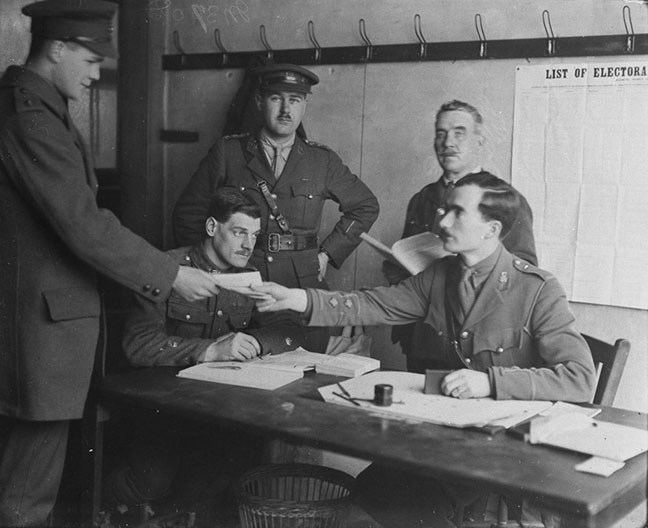 By Randy Evans
By Randy Evans
During World War One, Sarnia was fortunate in its political representations.
Municipally, Mayor William Robert Paul and Council had the foresight to acquire life insurance for the Cities’ soldiers.
Sadly, 102 families would have grounds to claim benefits.
Additionally, Sarnia council graciously granted to local soldiers’ direct families an allowance to help offset the income lost with the soldier’s departure overseas.
Provincially, Conservative M.P.P. William Hanna was Ontario’s Provincial Secretary.
In Ottawa, Sarnia was represented by F.F. Pardee the long time Chief Whip of the opposition Liberal Party. So influential was Pardee that Liberal leader and past Prime Minister Sir Wilfred Laurier wrote of the Sarnian as a brother.
Interestingly, as the War intensified, both Hanna and Pardee increased their respective political reaches.
By the summer of 1917, the War had consumed more Canadian soldiers than replacements. Additionally, the War effort continued to drain the nation’s food and natural resources.
In response, Conservative Prime Minister Robert Borden appointed Hanna to the powerful position of Canadian Food Controller, thereby overseeing Canada’s crucial wartime issues of food rationing and pricing of goods.
Regarding the military manpower deficiency, the Conservative Government passed The Military Service Act on 29 August 1917.
Through its requirement of conscription, the Act was overwhelmingly popular in English Canada, including Sarnia. Being vilified in Quebec, the Laurier Liberals opposed its compulsory enlistment. Laurier thus refused to join a wartime Coalition Government with the Conservatives.
The conscription issue evoked raw emotions, riots and uprisings. Against these considerable forces and in order to implement enforcement of the Act, Borden needed a government of immense political strength.
To accomplish this, Borden’s Conservatives passed The Wartimes Election Act on September 20, 1917.
The Act was a masterful stroke of political chicanery.
To ensure electoral support for conscription, the government took away the anti war vote from any consciousness objector or those born in enemy countries.
In contrast, the Act enfranchised the pro conscription vote of enlisted women and the female relatives of servicemen. Further, a soldier could stipulate in which riding his vote would be counted. To be sure, government operatives would be directing those pro conscription votes to ridings where a close run off was anticipated.
Finally, to ensure electoral victory, Borden invited Pardee and other pro conscription Liberals to jump ship and join the newly formed Conservative based Unionist Party.
A conscriptionist and sensing political loss at the polls as a Liberal, Pardee left the Liberals for the Unionist Party.
The 1917 national election was a particularly nasty campaign pitting English Canada against French Canada. Unionist posters decried Laurier as a “Slacker” and showed the German Kaiser toasting Liberal posters.
Predictably, election night of 17 December 1917 resulted in an overwhelming Unionist victory. Securing the highest popular vote in Canadian history, the Unionists took 153 federal seats as against just 82 for the Liberals – 62 from Quebec.
Confirming unconditionally Sarnia’s support for the War, Pardee under the Unionist flag was re-elected handily.
Conscription was enforced in January, 1918. The War continued for another eleven bloody months.
The 1917 election rift between English Canada and French Canada continues to this day.
